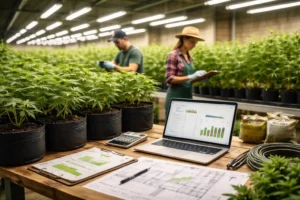
Illinois Hemp Ban Overturned in Rural Oakland
The City of Oakland tried to ban hemp farming inside its city limits by claiming authority under the Illinois Municipal Code section regarding Urban Agricultural Areas. Collateral Base represented the prejudiced farmer and had the municipal ordinance tossed by an Illinois Court. Because the City of Oakland is not a home rule community Dillion’s Rule in Illinois barred the City from banning hemp due to its lack of authority.
Let’s touch on what is a “home rule” or “non-home rule” municipality in Illinois. 39 States follow “Dillion’s Rule” – including Illinois – and it allows municipalities to allow themselves to govern their community with greater detail than the state law applies, but first they must become a “home rule” unit of government.
Q: What is “home rule,” why would a community want to become a home rule unit, and how?
A: In Illinois, home rule is the State constitutional authority of local governments to override the state and self-govern provided the General Assembly did not explicitly limit that power or maintain the exclusive exercise of authority in a specific area, for example the CRTA limited home rule communities from banning home grow cannabis for medical marijuana patients.
Home rule municipalities explicitly have police powers. Article 7 of the Illinois Constitution regarding home rule provides that they “may exercise any power and perform any function pertaining to its government and affairs including, but not limited to, the power to regulate for the protection of the public health, safety, morals and welfare; to license; to tax; and to incur debt” without specific statutory authority.
How home rule is different than non-home rule
Non-home rule basically bows to the state laws, unless the municipality has a statute or enumerated constitutional powers that enable it to create new ordinances. However, a home rule municipality can go beyond state regulations unless expressly pre-empted by statute and can rely on its police powers. Here we will examine the differences between the language from the Illinois Constitution on home rule units.
The City of Oakland went beyond its non-home rule powers when making its hemp farming ban.
Ill. Const. Art. 7, § 7 for Non-home Rule Municipalities
- to make local improvements by special assessment and to exercise this power jointly with other counties and municipalities, and other classes of units of local government having that power on the effective date of this Constitution unless that power is subsequently denied by law to any such other units of local government;
- by referendum, to adopt, alter or repeal their forms of government provided by law;
- in the case of municipalities, to provide by referendum for their officers, manner of selection and terms of office;
- in the case of counties, to provide for their officers, manner of selection and terms of office as provided in Section 4 of this Article;
- to incur debt except as limited by law and except that debt payable from ad valorem property tax receipts shall mature within 40 years from the time it is incurred; and
- to levy or impose additional taxes upon areas within their boundaries in the manner provided by law for the provision of special services to those areas and for the payment of debt incurred in order to provide those special services.
These are the only powers a non-home rule municipality in Illinois may have – so the City of Oakland had to try and find another statute that enabled them to ban hemp farming throughout its city limits. We will get to that soon, but we note that the City of Oakland then argued that the statutory authority did not matter because they could ban hemp under its police powers – but non-home rule municipalities do NOT have police powers. As you can see from the powers of the Home Rule Units under Section 6 of Article 7 of the Illinois Constitution below.
SECTION 6. POWERS OF HOME RULE UNITS
(a) A County which has a chief executive officer elected by the electors of the county and any municipality which has a population of more than 25,000 are home rule units. Other municipalities may elect by referendum to become home rule units. Except as limited by this Section, a home rule unit may exercise any power and perform any function pertaining to its government and affairs including, but not limited to, the power to regulate for the protection of the public health, safety, morals and welfare; to license; to tax; and to incur debt.
We put the police powers in bold.
What are Police Powers in Illinois?
They are: the power to regulate for the protection of the public health, safety, morals and welfare; to license; to tax; and to incur debt.
Urban Agricultural Areas in Illinois
The City of Oakland went to the Illinois Municipal Code and found a restriction against urban agricultural areas that a city can regulate if it bears a direct relationship with the public health, safety or welfare.
The only problem was – this law did not exist until 2019 and Oakland had no urban agricultural area. The City of Oakland tried to find any method they could to ban the hemp farming inside its city limits. The City argued that its zoning laws from 1968 qualified as an urban agricultural area. This is not how law works, as statutes do not operate retroactively.
Division 15.4 of the Illinois Municipal Code, titled Municipal Urban Agricultural Areas
The cited statute, 65 ILCS 5/11.4-30(a,) provides in full:
(a) A municipality may not exercise any of its powers to enact ordinances within an urban agricultural area in a manner that would unreasonably restrict or regulate farming practices in contravention of the purposes of this Act unless the restrictions or regulations bear a direct relationship to public health or safety. (Emphasis Added).
The City of Oakland skipped over all the regulatory hurdles to get to its objective of banning hemp. Illinois amended the Illinois Municipal Code in 2019 to provide for urban agriculture and provided protections and procedures for farmers to establish an “urban agricultural area.” We must review Article 11, Division 15.4 of the Code regarding Municipal Urban Agricultural Areas. The City looked straight past the controlling provisions of the Code in search of its desired ends – banning hemp farming in its City limits. The City skipped right over numerous Sections of the Code that requires prior to adopting an ordinance designating an urban agricultural area, the municipality must:
- receive an application for establishing an urban agricultural area [65 ILCS 5/11-15.4-15(a)];
- establish an urban agricultural area committee after receiving an application to so establish one [65 ILCS 5/11-15.4-10(a);
- elect a chair for that committee [65 ILCS 5/11-15.4-10(b)];
- fix a time and place for a public hearing and notify each taxing unit of local government [65 ILCS 5/11-15.4-20];
- publish notice of this hearing in a newspaper of general circulation for days before such hearing [65 ILCS 5/11-15.4-20]; and
- hold the public hearing; allow any interested person – like the Plaintiffs in this case – to appear and voice objections and comments with respect to the hearing [65 ILCS 5/11-15.4-20].
- Only after such public hearing, and in compliance with the procedures as provided in the Code, may the municipality adopt an ordinance establishing and designating an urban agricultural area [65 ILCS 5/11-15.4-20].
The City of Oakland did none of these things in banning hemp farming from its City limits. Instead, it just said that it did, which the court pointed out that it clearly did not and had no ‘urban agricultural area’ to regulate. Therefore, the City’s ban on hemp failed under judicial review. The City of Oakland may try to appeal the decision, but that won’t fix the problems with its hemp ban.
Illinois hemp bans may not be possible in home rule municipalities either because of the State’s comprehensive hemp licensing program, but that issue remains for another day.
Whether this is your first land use issue or most recent, our office has helped people and businesses alike.
Thomas Howard was on the ball and got things done. Easy to work with, communicates very well, and I would recommend him anytime.





